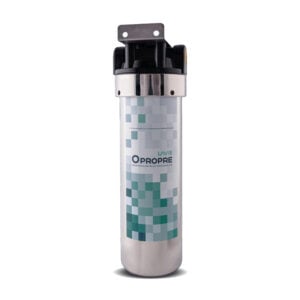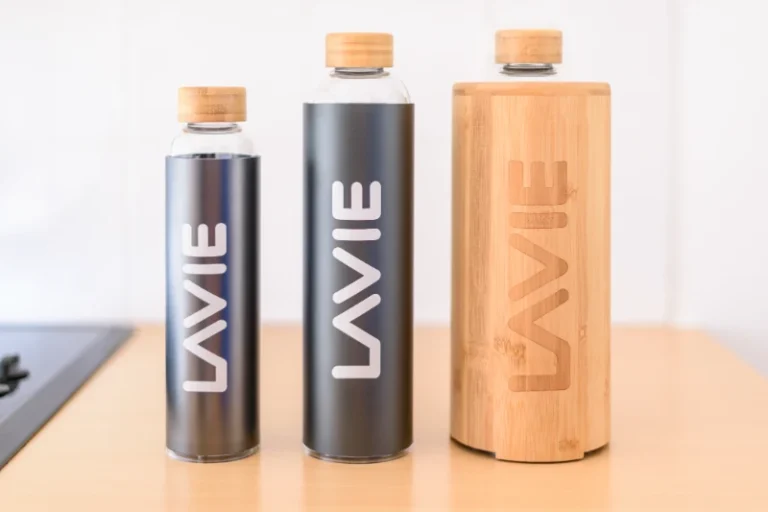
30-day money-back guarantee *
30-day money-back guarantee *

PFAS, also known aseternal pollutants"These chemicals, which have been used for decades in industry, are now being found in many French towns and cities. These chemicals, which have been used for decades in industry, are now being found in many French municipalities.
And just recently, a warning signal was sent out in France. In July 2025, their concentration in water led to 12 towns in the Ardennes to temporarily ban the consumption of tap water. Why is this? Because these toxic compounds are suspected of having serious effects on the body.
Faced with this worrying situation, more and more households are looking for a reliable way to protect their health. And among the most accessible options, the filter carafe is often highlighted (see our comparison of the best filter carafes).
But are they really effective against these pollutants? Can they really stand up to these invisible elements?
Let's take a look at what these filter carafes can (and can't) do, and what alternatives you should consider for purifying your drinking water.
PFAS (per- and polyfluoroalkylated) form a group of chemical elements that have been used since the 1950s in industry and in many everyday products: non-stick coatings, waterproof textiles, fire-fighting foams, food packaging, etc.
What makes them special? These compounds are extremely stable, to the point of not almost never deteriorate. This has earned them the nickname of eternal pollutants. As a result, they can be found everywhere in the environment, including in tap water, even in traces of substances that have been banned for years.
And their effects on health are increasingly worrying.
In 2023, the International Agency for Research on Cancer (IARC) has assigned some of these substances as carcinogenic or potentially carcinogenic. For example, PFOA is now classified as a "toxic" substance.carcinogenic to humans"and PFOSpossibly carcinogenic".
But that's not all: prolonged exposure can also lead to an increase in cholesterol levels, hormonal disorders, reduced fertility and an impact on foetal development.
That's why it's important to monitor their presence and choose a filtration solution that is genuinely capable of eliminating them, for optimum hydration without compromise.
The classic filter jugs (Brita, Philips, Aarke, Amazon...) have become popular in many homes in recent years. Easy to use, practical and space-saving, they improve taste by reducing chlorine and certain impurities. But when faced with a problem as serious as PFAS drinking water pollution, are they really up to the job?
Unfortunately, the answer is no.
They are generally made up of activated carbon-based cartridges, sometimes accompanied by ion exchange resins, to eliminate chlorine, certain organic residues, pesticides and correct taste. However, they are neither designed nor validated to effectively remove eternal pollutants over the long term. The result: they stay in your glasseven after filtration.
Worse still, these carafes have other limitations:
To sum up: although they can improve taste, these decanters are not suitable for eliminating PFAS. They even raise a number of health and environmental concerns.
So what system should you adopt to eliminate these resistant pollutants?
Faced with the invisible threat of PFASNot all filtration systems are created equal. While some carafes improve the taste of water, they are not designed to block these persistent elements. So which reliable alternatives can you turn to to really protect your health and that of your family? Let's take a look at the most effective technologies available today.
If you're looking for an effective, validated response to PFAS, Opropre Turquoise under-sink filter deserves your full attention. Developed by LAVIE, this model goes far beyond conventional filter carafes.
Thanks to high-quality coconut activated carbon, combined with a targeted resin, the Opropre Turquoise under-sink filter is able to remove pesticides, heavy metals, microplastics, nanoplastics, chlorine, sediments and, of course, eternal pollutants. All without removing the minerals essential to your body from your tap water.
And proven effectiveness. A study conducted by the Environmental Chemistry Laboratory at Aix-Marseille University showed that the filter can retain up to 27.4 mg of PFOA (used in non-stick coatings) and 23.8 mg of PFBA (found in some household products) per gram of resin. A top-level performance for domestic use.
But that's not all. This method also stands out for its controlled environmental impact. The cartridge is returnable, refillable and recyclable. Every six months, you send it back: LAVIE refills it with new activated carbon, while the old one is recycled in specialised industrial circuits. The resin follows the same process. A technology that is durable, reliable and perfectly suited to everyday use.
With Opropre Turquoise, you choose healthy water, an eco-responsible system and a no-compromise solution.

At first glance, all filter carafes look the same. But LAVIE is shaking things up with a unique technology: UV-A purification.
Unlike conventional models, the LAVIE carafe is based on a process inspired by nature. As the water passes through its glass bottle, it is exposed to UV-A light for 15 minutes. These rays trigger photolysis, which transforms the chlorine into reactive radicals capable of neutralising the pollutants. Once their action is complete, these radicals disappear. The result: soft, perfectly healthy water.
And unlike conventional models (Brita, Philips, Amazon...), LAVIE does not remove calcium or magnesium, minerals that are essential to your body. What's more, it doesn't release any undesirable elements, it doesn't alter the pH and it doesn't generate filters that have to be disposed of every month. So it's a alternative to filter carafes at the same time healthier, greener and more economical.
However, to go further, particularly in the fight against PFAS, LAVIE offers a complementary approach. While UV-A technology neutralises many substances, it cannot eliminate eternal pollutants. For optimum purification, it should be used with the Opropre Turquoise under-sink filter. Together, they form a reliable, long-lasting duo that is perfectly suited to today's health challenges.

Reverse osmosis is often presented as the most advanced method of filtering tap water. And for good reason: with its semi-permeable membrane, it eliminates up to 99 % of contaminantsincluding PFAS. On paper, this performance makes it a particularly reassuring system.
In practice, however, this technology has a number of limitations:
Reverse osmosis does not distinguish between good and bad elements: it also filters out essential minerals such as calcium and magnesium. The result is water that is too acidic, requiring remineralisation, which is rarely optimal.
Installation often requires the intervention of a professional. And to maintain water quality, several products need to be replaced regularly (sediment filter, membrane, remineralisation cartridge, etc.), which adds to the cost and maintenance burden.
For every litre of water filtered, the osmosis unit discharges between 2 and 4 litres of polluted water. Then there are the non-recyclable consumables and the waste generated.
In other words, reverse osmosis is effective, but has an impact on the composition of the water, your budget and the environment.
For a simpler, more sustainable and more environmentally friendly alternative, the Opropre under-sink filter is still the best choice. the best-performing solution against eternal pollutants, while preserving healthy, balanced water that's pleasant to drink.
When confidence in tap water wanes, many turn to bottled water, perceived as a safer option. And yet, This choice raises a number of problems.
Firstly, in terms of health: studies have shown that the presence of microplastics in many bottles, including those from major brands. What's more, these waters are not automatically free from PFAS, some of which have been detected in tested samples.
Then there's the cost: drinking only bottled water is much more expensive in the long term than a home filtration system. Then there's the inconvenience of transporting and storing it on a daily basis.
Finally, the ecological impact is major. Every year, billions of plastic bottles are produced and thrown away, with recycling rates still too low. As a result, tonnes of waste accumulate and pollute our planet.
As you can see, bottled water is not a sustainable solution. nor a guarantee of purity. For healthy, economical and environmentally-friendly hydration, it's best to opt for a suitable and safe home filtration method.
Unfortunately, the answer is no, at least not with a conventional filter carafe. While these solutions do improve taste and reduce certain harmful substances, they are not the only ones, they are not designed to eliminate PFAS reliably.
For effective protection against these pollutants, it's best to opt for a tested and validated technique, such as the Opropre Turquoise under-sink filter. And to go one step further, the LAVIE carafe, combined with Opropre, offers even healthier purification, for balanced water and optimum hydration every day.
Together, they form a safe, sustainable and reassuring response to today's water quality challenges.
No carafe filter can effectively eliminate PFAS. Only a tested device such as the Opropre Turquoise under-sink filter, enriched with targeted resin, has been shown to eliminate PFAS. its ability to retain these eternal pollutants. For a more complete approach, it can be combined with the LAVIE decanter, which neutralises other contaminants thanks to its UV-A technology.
The most reliable method is to adopt a home filtration technique that has been scientifically validated, such as the Opropre Turquoise filter. This under-sink filter effectively retains PFAS while preserving essential minerals. Reverse osmosis can also eliminate them, but with significant disadvantages (depleted water, extra cost, wastage, etc.).
The LAVIE carafe stands out for its innovative filterless system, which uses UV-A light to neutralise pesticides, drug residues, bacteria, etc., while preserving the minerals that are essential to the health of the organism. proper functioning of your body. It is a healthier, longer-lasting and more economical alternative to conventional filter jugs.
Yes, as long as you buy a product that respects the natural and beneficial balance of water. Some conventional filter carafes remove essential minerals or release undesirable substances. On the other hand, the LAVIE carafe and Opropre gently purify your water. while preserving trace elements. The result: healthy, balanced hydration that tastes great.
Want to keep up to date with our water-related articles?
Subscribe to our Newsletter below
and get -5% on your first order!
Lost your password? Please enter your login or your e-mail address. You will receive a link by e-mail to create a new password.